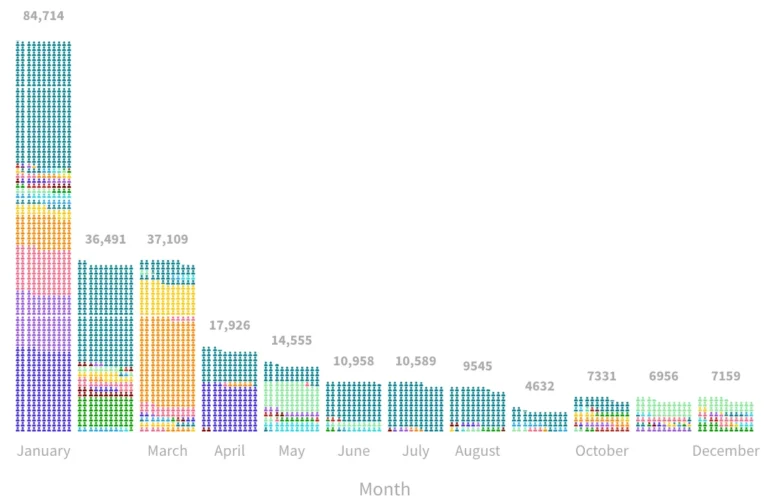
Blockchain technology beyond cryptocurrency has been making waves for its transformative potential across a variety of sectors. While Bitcoin and other digital currencies grabbed the headlines, the underlying blockchain framework is proving to be a game-changer in industries such as supply chain management, healthcare, real estate, and even voting systems. Let’s dive in and explore how this innovation is reshaping our world.
“Blockchain is not just about crypto; it’s about creating trust in digital interactions.” — An industry expert
In this article, we’ll journey through the fascinating realms where blockchain is paving the way for unprecedented transparency, efficiency, and security. Buckle up as we traverse real-world applications, intriguing case studies, and future predictions that underscore blockchain’s versatility.
What is Blockchain Technology?
At its core, blockchain is a decentralized ledger that records transactions across a network of computers in a secure and immutable manner. Unlike traditional databases, blockchain eliminates the need for a central authority, thereby reducing the risk of fraud and data tampering. This distributed ledger technology (DLT) uses cryptographic techniques to ensure that every transaction is transparent and verifiable.
Key Features of Blockchain Technology
Decentralization: No single entity controls the entire network, making it more resilient.
Immutability: Once recorded, transactions cannot be altered, ensuring data integrity.
Transparency: Every participant in the network can verify transactions, leading to greater trust.
Security: Advanced cryptography protects sensitive data from unauthorized access.
Blockchain technology beyond cryptocurrency is being leveraged to solve real-world problems by enabling secure data sharing and automated contract execution through smart contracts. With innovations emerging from academic journals like IEEE and Nature, and backed by data from Gartner and Statista, the impact of blockchain is evident across various sectors.

Blockchain in Supply Chain Management
Supply chain management has long been plagued by inefficiencies, lack of transparency, and fraud. However, blockchain technology is turning the tables by ensuring every step of a product’s journey is recorded in real time.
Enhancing Transparency and Traceability
Blockchain technology beyond cryptocurrency offers a robust solution for supply chain traceability. Companies can now track the origin of raw materials, monitor the manufacturing process, and verify the authenticity of products. This level of transparency not only improves operational efficiency but also helps in building consumer trust.
For instance, IBM Food Trust has partnered with major retailers to ensure food safety by tracking produce from farm to table. By providing real-time data, blockchain helps prevent food fraud and contamination. Similarly, Maersk’s TradeLens platform uses blockchain to streamline shipping processes, reduce paperwork, and lower the risk of errors.
Case Study: IBM Food Trust
IBM Food Trust leverages blockchain technology beyond cryptocurrency to create a transparent supply chain for the food industry. In a recent report by IBM, retailers and suppliers have reported a significant reduction in product recalls and enhanced consumer trust due to increased traceability.
Real-World Benefits
Reduced Fraud: With immutable records, counterfeit products are much easier to detect.
Operational Efficiency: Automated tracking reduces administrative overhead and speeds up the supply chain.
Enhanced Collaboration: All parties involved in the supply chain can access the same verified information, reducing disputes and misunderstandings.

Blockchain in Healthcare
The healthcare industry stands to gain enormously from blockchain technology beyond cryptocurrency. As patient data becomes increasingly digitized, ensuring its security and accessibility is paramount.
Improving Data Security and Interoperability
Blockchain provides a secure platform for storing and sharing sensitive patient information. Hospitals and clinics can leverage blockchain to create interoperable health records that remain consistent across different systems. This ensures that a patient’s medical history is always up-to-date, regardless of where they seek care.
A notable example is the partnership between Guardtime and several European healthcare providers. Guardtime’s blockchain platform is used to secure patient records, thereby minimizing the risk of data breaches and ensuring compliance with data protection regulations like GDPR. Moreover, blockchain facilitates seamless data exchange between medical professionals, leading to improved diagnostic accuracy and patient outcomes.
Expert Insight:
“Blockchain is revolutionizing healthcare by ensuring that patient data is secure and accessible, enabling better decision-making and personalized treatment,” notes Dr. Anna Roberts, a healthcare technology consultant.
Key Benefits for Healthcare
Enhanced Data Security: Immutable records mean that patient data is less vulnerable to cyber attacks.
Streamlined Patient Care: Real-time access to medical records improves collaboration among healthcare providers.
Regulatory Compliance: Blockchain’s traceability assists in meeting stringent data protection regulations.
Overcoming Industry Challenges
While the potential of blockchain in healthcare is immense, there are challenges too. Integration with legacy systems and the need for industry-wide standards are hurdles that must be addressed. However, continuous innovations and supportive regulations are paving the way for broader adoption.

Beyond Supply Chain and Healthcare: Other Real-World Applications
Blockchain technology beyond cryptocurrency is not confined to just supply chain and healthcare; its applications extend to several other domains that demand trust and transparency.
Identity Verification and Management
One of the most promising uses of blockchain is in the realm of digital identity. With data breaches becoming increasingly common, blockchain offers a secure way to manage personal identification. By creating decentralized identity systems, individuals can control their own data, reducing the risk of identity theft.
Self-Sovereign Identity (SSI): This approach allows users to own and manage their digital identity without reliance on a central authority.
Secure Authentication: Blockchain can enhance the security of online transactions, reducing the risk of fraud in areas like banking and e-commerce.
Voting Systems
Elections have historically been vulnerable to fraud and mismanagement. Blockchain-based voting systems promise to enhance the integrity of electoral processes by ensuring that votes are tamper-proof and easily verifiable. Several pilot projects around the world have demonstrated the potential of blockchain to build trust in democratic processes.
Real Estate and Property Management
Real estate transactions are notorious for their complexity and lack of transparency. Blockchain technology simplifies the process by recording property deeds, titles, and transactions on a secure ledger. This minimizes the risk of fraud and significantly reduces the time required to close deals.
Real-World Example:
A startup in Berlin recently discovered that blockchain could streamline property management, reducing paperwork by automating verification processes. This innovation has spurred interest among European real estate investors looking to cut costs and improve efficiency.
Intellectual Property and Copyright
Artists, musicians, and content creators are increasingly turning to blockchain to secure their intellectual property rights. By timestamping and recording creative works on an immutable ledger, creators can prove ownership and combat piracy.
Key Takeaways for Other Applications
Enhanced Security: Whether it’s for voting or property management, blockchain’s robust security features are a major advantage.
Improved Transparency: Every transaction is recorded and accessible, reducing the scope for corruption.
Efficiency Gains: Automated processes lead to quicker and more reliable outcomes in various industries.

Challenges and Ethical Considerations
While the potential of blockchain technology beyond cryptocurrency is vast, it’s not without its challenges. As industries integrate blockchain into their core operations, several ethical, technical, and regulatory issues need to be addressed.
Technical Challenges
Scalability: As the number of transactions increases, maintaining the efficiency of the blockchain can be challenging.
Interoperability: Integrating blockchain with existing legacy systems often requires significant technical overhaul.
Energy Consumption: Some blockchain networks consume high amounts of energy, leading to environmental concerns.
Regulatory and Ethical Dilemmas
Privacy vs. Transparency: While blockchain’s transparency is an advantage, it can conflict with privacy laws. Balancing these aspects is crucial.
Standardization: The lack of industry-wide standards makes it difficult for businesses to adopt blockchain on a large scale.
Risk of Centralization: Ironically, some blockchain systems are showing signs of centralization, which undermines their fundamental decentralized ethos.
Rhetorical Question:
But is this innovation without risks? Not entirely. The journey towards integrating blockchain in real-world applications is riddled with both opportunities and obstacles.
Addressing the Challenges
Industry leaders and policymakers are working collaboratively to address these challenges. Reports from Gartner and Statista suggest that by 2025, scalable blockchain solutions will be more commonplace as technological advancements and regulatory frameworks mature.
Collaborative Initiatives: Multi-stakeholder partnerships are crucial. For instance, the IEEE Blockchain Initiative works to develop standardized protocols.
Sustainable Practices: Innovations aimed at reducing energy consumption are gaining traction, ensuring that blockchain remains environmentally sustainable.

Future Outlook: Innovations and Predictions
The future of blockchain technology beyond cryptocurrency is bright and filled with exciting possibilities. As industries continue to explore its applications, we can expect significant advancements in both technological capabilities and regulatory frameworks.
Emerging Trends to Watch
Integration with IoT: Combining blockchain with the Internet of Things (IoT) can create secure, autonomous networks for smart cities, logistics, and more.
Decentralized Finance (DeFi): While traditionally linked to crypto, DeFi innovations are finding applications in non-financial sectors such as insurance and supply chain finance.
Enhanced Security Protocols: New cryptographic methods and consensus mechanisms are being developed to make blockchain even more robust.
Cross-Industry Collaborations: From healthcare to real estate, industries are partnering to create interoperable blockchain solutions that address common challenges.
Predictions for 2025 and Beyond
Experts predict that by 2025, blockchain technology will be integrated into nearly every sector that values security, transparency, and efficiency. A recent study published in Nature emphasizes that the adoption of blockchain is expected to grow exponentially, especially in sectors that require high data integrity and decentralized operations.
Expert Quote:
“Blockchain’s evolution is a testament to its versatility. We’re just scratching the surface of what this technology can achieve in the realms of healthcare, supply chain, and beyond,” said a leading researcher from MIT Tech Review.
Innovations on the Horizon
Smart Contracts 2.0: Expect more advanced smart contracts that can handle complex conditions and integrate with artificial intelligence for dynamic decision-making.
Interoperable Blockchains: Future systems will allow different blockchain networks to communicate seamlessly, opening up endless possibilities for data sharing and business collaboration.
User-Friendly Interfaces: As blockchain moves into mainstream applications, developers are focusing on creating intuitive platforms that make blockchain accessible to non-technical users.

Real-World Case Studies
To truly appreciate the power of blockchain technology beyond cryptocurrency, let’s take a closer look at some real-world case studies that illustrate its impact.
Case Study 1: Enhancing Supply Chain Transparency with IBM Food Trust
IBM Food Trust is one of the most compelling examples of blockchain in action. Major retailers and suppliers use the platform to monitor the journey of food products from farm to shelf. This system:
Increases Accountability: Every transaction is recorded, allowing for rapid identification of issues.
Boosts Consumer Confidence: Shoppers can trace the origins of their food, ensuring quality and safety.
Drives Efficiency: Automation reduces paperwork and administrative overhead, streamlining operations.
A detailed report by IBM highlights how the implementation of blockchain has led to fewer food recalls and increased operational transparency.
Case Study 2: Securing Healthcare Data with Guardtime
Guardtime’s blockchain platform has been adopted by several healthcare institutions across Europe. This system secures patient records and ensures that sensitive information is accessible only to authorized personnel. The benefits include:
Enhanced Data Integrity: Patient records remain tamper-proof and verifiable.
Improved Interoperability: Different healthcare providers can access consistent, real-time data.
Regulatory Compliance: The system helps institutions adhere to strict data protection regulations like GDPR.
A recent study published in IEEE underscores the positive impact of Guardtime’s platform in reducing data breaches and improving patient outcomes.
Case Study 3: Revolutionizing Real Estate Transactions
In the real estate sector, blockchain is transforming the way properties are bought and sold. A startup in Berlin developed a blockchain-based system that automates property title verification, thereby reducing fraud and significantly cutting down processing times. Key outcomes include:
Faster Closings: Automated processes replace traditional, time-consuming paperwork.
Increased Trust: Immutable records boost confidence among buyers and sellers.
Cost Savings: Reduced administrative overhead leads to lower transaction costs.
This case study has garnered attention in reports by Forbes, highlighting blockchain’s potential to modernize age-old industries.
Conclusion: The Road Ahead for Blockchain Innovation
Blockchain technology beyond cryptocurrency is not just a buzzword—it’s a transformative force driving efficiency, security, and transparency across multiple industries. From revolutionizing supply chain management with platforms like IBM Food Trust to securing sensitive healthcare data through Guardtime, blockchain’s applications are as diverse as they are impactful.
As industries continue to grapple with the challenges of data integrity and trust, blockchain stands out as a beacon of innovation. Whether you’re a business leader looking to streamline operations, a healthcare provider striving for better patient outcomes, or simply an enthusiast keen to stay ahead of technological trends, the future of blockchain is undeniably promising.
So, where does this leave us? With continuous advancements, cross-industry collaborations, and supportive regulatory frameworks, blockchain is set to redefine traditional processes and unlock new opportunities. While challenges remain, the journey towards a decentralized future is well underway.
By exploring the diverse applications of blockchain technology beyond cryptocurrency, we uncover a landscape of innovation that promises to redefine how industries operate. With practical implementations, case studies, and expert insights, it’s clear that blockchain isn’t just a fad—it’s a fundamental shift towards a more transparent, secure, and efficient future. Whether you’re involved in logistics, healthcare, or any industry in between, the opportunities presented by blockchain technology are truly limitless.
Let’s embrace the journey and stay curious about what comes next!
Subscribe for weekly tech insights and stay updated on the latest in blockchain and beyond!





